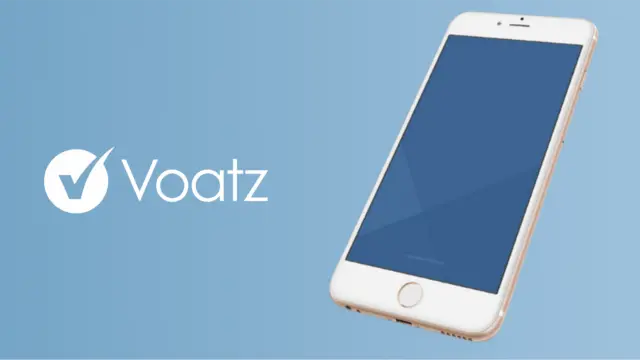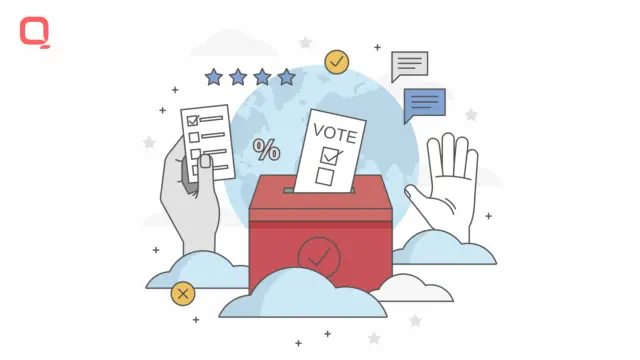Can you imagine that despite being the backbone of any democratic nation, elections face some issues like voter fraud, vote tampering and result delays?
The electoral process has been marred by these problems leading to a diminished public confidence in its authenticity. But what if there was a solution which could deal with these challenges and restore integration value in democracy? Yes! This is possible with Blockchain Development company in USA.
As per recent data from the Electoral Integrity Project, over half of all countries assessed (52%) experienced some form of electoral integrity issues. Nevertheless, emerging technologies such as blockchain are offering hope for resolution. The secure and transparent properties of blockchain technology make it an ideal decision for transforming the conduct of elections into fair ones.
For example, let us discuss the 2018 West Virginia primary election.
In that election, overseas military personnel used Voatz, a blockchain-based mobile application, to vote. The outcome was remarkable. This app handled instant identification verification of individuals, hence recording votes on an immutable distributed ledger, which made it impossible to hack.
 The incorporation of blockchain technology in elections can really provide unmatched transparency and security levels. However, is this really free and fair for elections? Let’s find out the truth behind this.
The incorporation of blockchain technology in elections can really provide unmatched transparency and security levels. However, is this really free and fair for elections? Let’s find out the truth behind this.
Read also:- Is Blockchain Intellectual Property Protection the Answer to Creators’ Copyright Problems?
Benefits of Blockchain in the Electoral Process
Blockchain has the capacity to revolutionize how elections are achieved, imparting numerous advantages that can improve potential with, protection, and effectiveness inside the electoral system. Let’s explore some methods wherein blockchain may alternate the extent of elections.

- Immutable and Tamper-Proof Votes: The great aspect about using blockchain technology in elections is that it makes votes each unchangeable and tamper-proof. Every vote positioned at the blockchain is secured and linked to the preceding vote, forming an everlasting document. This ensures that after a vote is submitted, it can not be altered or eliminated. This degree of transparency helps prevent any fraudulent conduct, like converting or casting off votes.
Example: Picture this: a local network election imposing a blockchain-based vote casting machine. Every resident’s vote is securely saved on the blockchain, ensuring the results’ integrity. This fosters agreement with most of the community and encourages better participation in upcoming elections.
- Ensures Transparency and Verification at Every Stage: Blockchain technology always promotes transparency and enables verification of each vote. Due to its decentralized nature, each person has permission to take a look at the blockchain to ensure that voting information is correct and transparent. This accelerated transparency fosters more belief within the electoral system by permitting people to independently verify the legitimacy of the results.
Example: In a national election, where millions of votes are recorded on the blockchain, citizens can effortlessly view and confirm the votes solidly. This offers them self assurance inside the credibility of the electoral system and reduces hypotheses or doubts approximately the accuracy of the outcome.
- Real-Time Vote Counting and Results: By using blockchain generation, the electoral process can be drastically expedited and made greater efficiency. Real-time vote counting and results become possible, doing away with the need for manual counting and decreasing human mistakes. Contributing in a fair and free election process. In this manner, citizens and candidates could have on the spot get permission to evaluate the preliminary results, permitting faster evaluation and selection-making.
Example: Candidates running for the workplace can closely screen the vote and be counted as it is in real time, permitting them to strategize their campaign efforts. Additionally, citizens can live engaged within the election process by witnessing the actual-time progress and final results.
- Increased Accessibility and Inclusivity: Blockchain Technology can speed up accessibility and inclusivity within the electoral process. Traditional voting techniques regularly present challenges for individuals with physical disabilities or the ones dwelling in faraway regions. By permitting online voting via blockchain systems, individuals can take part in the electoral process from any place and use of devices.
Example: Remote and underserved communities can enjoy higher inclusion through blockchain-based virtual voting. Individuals who face challenges in obtaining polling stations, along with aged or disabled people, can easily exercise their right to vote from the consolation and convenience of their homes.
- Trust in Remote Voting: Another best advantage of blockchain inside the electoral technique is its capability to instill trust in voting. With traditional far off voting methods, concerns related to the the safety and integrity of votes always comes. By using blockchain technology, trust can be mounted through the encryption, immutability, and verification capabilities that the technology provides.
Example: In a countrywide election with residents living overseas, in which postal voting is regularly tough and a challenge to ability fraud, a blockchain-based far off remote area can offer an extra secure and reliable alternative. Citizens can cast their votes online with confidence, understanding that their votes are blanketed and tamper-proof.
Elimination of Intermediaries and Cost Reduction
Integrating blockchain into the electoral procedure removes the need for intermediaries, which include polling officers or third-party auditors, lowering expenses and streamlining operations. The computerized nature of blockchain transactions ensures a greater efficiency and cost effective voting system, saving assets and improving basic productiveness.
Example: A national election adopts the blockchain era to eliminate guide counting tactics and decrease administrative cost. By automating the verification and recording of votes, the electoral commission achieves extensive cost savings and allocates sources extra efficiently.
Secure Voter Identity Verification
Blockchain technology gives a steady and reliable method for verifying voter identities, mitigating risks associated with fraudulent registrations or a multiple voting instances. Through the creation of unique cryptographic identities for the electorate, blockchain ensures the authenticity and legitimacy of each player, safeguarding the integrity of the electoral system.
Example: In a regional referendum, blockchain-based totally voter identity protects in opposition to identification robbery and guarantees that most effective eligible individuals can cast their votes. The cryptographic verification manner complements security and trust inside the electoral device, stopping unauthorized and fraudulent activities.
Traceable and Auditable Electoral Records
Blockchain’s clear and immutable nature allows the tracing and auditing of electoral data, enhancing responsibility and integrity inside the voting technique. Each vote cast is permanently recorded on the blockchain, taking into consideration complete audit trails that can be proven by using stakeholders and government to uphold the reliability of election outcomes.
Example: In a university scholar council election, blockchain technology helps the auditing of voting statistics to validate the final results. Students can access the blockchain ledger to check the integrity of the elections, ensuring that the consequences should replicate the preferences of the student frame.
Read also: How is Blockchain Disrupting the Energy Sector? Benefits and Use Cases
Challenges and Concerns in Implementing Blockchain in the Electoral Process
While blockchain technology holds top notch ability to revolutionize the electoral system, there are several challenges and consideration that need to be addressed to make sure its a successful implementation. Here are specific challenges and personalized eventualities that spotlight the want for cautious attention in adopting blockchain for elections.
- Digital Divide and Accessibility: One of the primary demanding situations is the virtual divide, which refers to discrepancies in internet access and technological infrastructure across exclusive areas and socioeconomic groups. Implementing blockchain-primarily based voting structures can also inadvertently exclude individuals who have access to the necessary technology or reliable internet connections.
- Security Vulnerabilities: While blockchain is framed for its protection features, no machine is entirely proof against ability vulnerabilities. If the underlying blockchain technology or the assisting infrastructure is compromised, it can jeopardize the integrity of the electoral technique. Additionally, ensuring the stable transmission of votes and maintaining the privacy of citizens are constant concerns whilst deploying blockchain-primarily based voting systems.
- Lack of Legal Frameworks and Standardization: The integration of blockchain generation into the electoral process calls for the improvement of legal frameworks and standards that address the precise demanding situations and requirements of blockchain-based voting. Governments and regulatory bodies need to set up guidelines for privacy safety, auditing methods, dispute resolution, and universal accountability.
- Inadequate Understanding and Trust: Implementing a new and complex technology like blockchain requires fine knowledge and consideration from all stakeholders approval. Voters, election officials, and candidates may have limited information on blockchain and its implications for the electoral method. Building trust and self-assurance within the technology through training, transparency, and pilot initiatives are crucial to ensure a successful adoption.
- Identity Verification: One of the crucial challenges in imposing blockchain within the electoral process is verifying the identity of citizens. Blockchain-based total voting structures require a strong identity mechanism to make sure that every candidate is eligible and has the right to cast a vote. Developing a steady and reliable verification tool always stays a primary concern.
- Voter Privacy: While transparency is a fundamental element of blockchain, the need to balance transparency with voter privacy will become critical. In this situation strong solutions should be implemented to ensure that electorate’ data remain confidential whilst nevertheless allowing for public auditability of the overall procedure.
Real-World Examples
- Estonia: Estonia is often hailed as a pioneer in implementing blockchain in elections. Since 2014, they have conducted a couple of elections using a blockchain-based platform referred to as “e-Estonia.” The tools permits citizens to vote securely online, making sure transparency, accessibility, and performance.
- West Virginia: In a pilot program for the 2018 US midterm elections, West Virginia applied a blockchain-based that was based on a mobile vote casting solution. This solution aimed to provide secure and auditable voting for military employees located overseas. Overall, the pilot received fantastic feedback, highlighting the capacity for wider adoption.
- Moscow, Russia: In 2019, Moscow conducted a pilot task to check the usage of blockchain in town council elections. The challenge aimed to boost transparency and prevent vote manipulation. It allowed citizens to witness the counting vote system in real-time.
- Sierra Leone: In 2018, Sierra Leone became the primary country to apply blockchain technology in a national election. Blockchain-based e-vote casting was applied to ensure transparency and limit fraud within the election process.
Read also:- How to Create a Private Blockchain for Enhanced Security: A Step-by-Step Guide for Businesses
Conclusion
Integrating blockchain technology inside the electoral process is extremely good potential for governments worldwide. However, there are challenges to address, which include verifying people’s identities, coping with large numbers of electorate, protecting people’s privacy, and helping everyone understand the technology.
Governments need to work with professionals and listen to other’s critiques to solve those demanding situations. By doing so, we will make blockchain-based elections commonplace and build trust in the democratic process.
At QSS Technosoft, we are a Blockchain Development company in USA that specializes in developing custom blockchain solutions for governments. We have the experience to help the government use blockchain to enhance elections. Contact us today to understand about how we will let you make elections stable, obvious, and efficient with blockchain generation. Let’s work collectively to shape a better destiny for democracy.
We are proud to mention that our work has been recognized by leading B2B reviews and research platforms like GoodFirms, Clutch, MirrorView, and many more.


How Govt Uses Blockchain In the Electoral Process. Is it free and fair for elections?